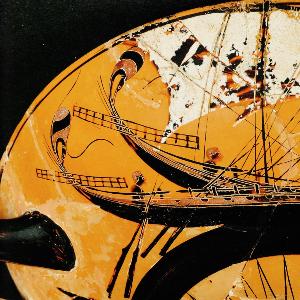Living in the face of doom
23 Aug 2021
“The society was constantly in motion": Ancient historian Martin Zimmermann on the spirit of optimism and sense of crisis in the Greek polis
23 Aug 2021
“The society was constantly in motion": Ancient historian Martin Zimmermann on the spirit of optimism and sense of crisis in the Greek polis

Trade with colonies: Ceramics made in ancient Athens were often exported; the site of discovery is Vulci/Italy. | © akg-images / Erich Lessing
Don’t be fooled by the Playmobil figures on Martin Zimmermann’s shelf. Between the academic literature stands Zeus with lightning bolts in his hand, a beard on his face and a golden laurel wreath in his hair. The father of the gods in miniature. Also looking like something from an Asterix comic is a set of Roman troops with their shields in formation. Antiquity as a picture of the brave and the noble. Anyone talking to Martin Zimmermann about the ancient world had better be prepared to challenge a few commonly held notions. “The people of antiquity lived in precarious circumstances,” says the Munich-based ancient historian. “The positive notions we have of it are more like idealized images of the modern era; they have little to do with ancient reality.”
The poleis, as the city-states of ancient Greece are called, regularly had various crises to deal with: famines, earthquakes and internal political tensions. But then what about the gigantic buildings like the Parthenon on the Acropolis in Athens? “Those are exceptions; the average polis was small,” says Zimmermann. “If you want to get an idea of the size of ancient cities, just take a trip to Oberammergau. They were face-to-face societies—everybody knew everybody there."
If you want to get an idea of the size of ancient cities, just take a trip to Oberammergau. They were face-to-face societies—everybody knew everybody there.Professor Martin Zimmermann
As a professor of ancient history at LMU, Zimmermann devotes part of his work to the polis as a new form of life in antiquity, with its social structures and the complex relationships between city and hinterland. So he is good at explaining how it all fits together, the great achievements on the one hand and the precarious conditions on the other. And how urban societies were able to stabilize themselves over the centuries despite being in a permanent state of crisis.
To answer these complex questions, the ancient historian first sends us back to the beginnings of the young Greek societies of antiquity. It is from the 8th century BC that they become tangible, with hardly anything known about the centuries before that. Ancient cultures such as the Mycenaeans disappeared in the aftermath of the so-called Sea Peoples Storm around 1200 BC. New and aspiring aristocratic societies were formed in the Dark Ages that ensued. These are celebrated in Homer’s epics, the famous Iliad and the Odyssey, which draw the otherwise forgotten period to a sensational close. But it was a time when the nobles had to ensure their own survival, standing their ground against political infighting, intrigues and power shifts internally, all the while defending themselves against external enemies and coping with natural disasters and epidemics. “Ancient societies, even powerful cities like Athens, were in constant crisis mode,” says Zimmermann.
But this itself was the driving force behind the subsequent cultural flourishing of the Greek city-states, their dominance and their success, even in Sicily and southern Italy. Certainly by the time of Alexander the Great, poleis are to be found across large parts of the Mediterranean and as far as the Near East. “The young society was constantly in motion,” says the ancient historian. “It drew an important part of its capacity for renewal from coping with unstable conditions.”
In order to be able to establish urban structures within this fragile environment in the first place, people had to learn to deal with the uncertainties—something that is topical again today given the major crises we face such as climate change. The ancients knew they had to live with the constant threat of doom. “For them, it was not a contradiction in terms to be living in precarious conditions on the one hand, but also to see their cities as places full of joie de vivre, optimism and dynamism,” says Zimmermann.
The historian paints a picture of a highly dynamic society—one that first had to find itself and form itself into an urban society. “There were different social groups: the rich farmers with plenty of land, who could be called nobles, and then the slaves and the free laborers, the peasant farmers, the strangers,” says Zimmermann. In these communities, which we would tend to view as villages today, people decided to create a center, with a central cult, a worshipping of the gods, and a place to gather and make decisions. “You just have to think about the situation,” says Zimmermann. It was all about small steps at first, but they raised big questions: Who makes the decisions, an individual or the community? How do you distribute tasks and offices, such as priesthood or military leadership? How do you resolve a conflict?
Everything had to be renegotiated constantly: the role and selection of central officeholders, the question of how long people would be in office, who should be involved in decisions, and who was allowed to participate in assemblies as citizens. The different poleis took different approaches to this. “Athens finally surged ahead with its idea of democracy, which caused problems in many other cities: did they want democratic rule, or would they rather have the old oligarchic rule, or would there even be an autocrat, a tyrant, who usurped power?” explains Zimmermann. As a way of dealing with such conflicts in their polis, the Athenians invented ostracism, a democratic procedure whereby anyone could be accused of striving towards tyranny and expelled from Athens.
Often it was not possible to settle a dispute, says Zimmermann. Constant civil wars were the result. “The dispute over the constitution was fought by brutal means; it was about power, wealth, money,” he says. “The oligarchs and the democrats fought for supremacy; there were tangible interests behind it.” However, people also realized that permanent strife was not a solution if they wanted to live a normal life. “Consensus was necessary for survival,” Zimmermann says. People wanted to get a grip on the situation.
Laws were often enacted in response to a crisis. They are, in a sense, written solutions to a problem.Martin Zimmermann
As evidence of this, the LMU ancient historian points to the earliest laws that dealt precisely with the distribution of offices and with social issues. Historical texts reveal that there was great dissatisfaction about the fact that the same families always occupied powerful positions, such as being priests and holding the supreme command. The population often disagreed with the way rule was exercised and demanded transparency, in other words laws. “Laws were often enacted in response to a crisis,” says Zimmermann. “They are, in a sense, written solutions to a problem.”
The Athenian statesman Solon, for example, wrote a collection of laws in the early 6th century BC on such issues as debt bondage and the disintegration of the aristocracy. “Draco, known for his draconian punishments, also did nothing but write down punishments that were already known,” Zimmermann says. Later, the Romans too adopted this tradition by inscribing the Law of the Twelve Tables on tablets in the Roman Forum so that people could reliably look up the criteria by which decision-makers made their judgments.
For the LMU ancient historian, the upheavals in ancient societies are a prime topic; he is currently working on a new book about the lost cities of antiquity, abandoned places that lay right alongside newly built settlements. Zimmermann talks enthusiastically about his research. According to scholars from New York University, there were 38,000 cities in antiquity, as recorded in their Pleiades project. Often, these were just self-contained towns with an associated hinterland. “The founding, creation, destruction and abandonment of places was ubiquitous,” says Zimmermann. “Ruins were a natural part of the ancient world.”
To research his book on lost cities and how ancient societies perceived and related to them, Zimmermann went to the Historisches Kolleg in Munich as a Senior Fellow. “Books like this, which can also interest a broader audience, are important to me,” says Zimmermann. Many topics from the ancient world still have a wide relevance today, he says. Back then, more than 2,000 years ago, it was less about the morbid charm that today’s lost cities exert and more about reminding people how fragile life is. People were also supposed to remember the crises they had lived through, to reflect on what had gone wrong and led to disaster.
“People in antiquity were not really able to protect themselves from earthquakes or crop failures brought on by drought,” Zimmermann explains. “They could only interpret such major crises as a sign that they had done something wrong in their worship of the gods. They lived with the feeling that everything was a threat.” But surprisingly there was no real concept of crisis in antiquity. The term existed only in medicine: crisis marks the point in the course of a disease at which things either start to go uphill again or go right downhill. “Ancient societies prepared for life in crisis by having a whole host of deities at their side to help them,” says Zimmermann. Giving birth, for example, was a cause of extreme anxiety; to alleviate the fear there were up to 30 deities, one for each phase of the birth: relying on the presence of the gods was for them a crisis management strategy. So the complex universe of the gods, as well as many ancient texts that wrote of it, also reflect the everyday adversities and uncertainties the people faced. The stories tell of how important it was to bring order into the world, to defeat the external enemy, the monster, the danger.
At their core, however, the great epics such as the Iliad with its battle for Troy convey another message: “These works also offer a historical depth that the young society itself didn’t have,” says Zimmermann. “They tried to give a historical basis to a very diverse society via a myth; the point was to create a sense of ‘we’ among the Greeks. Those who were not listed in the Catalogue of Ships in Homer’s Iliad, which lists the warships, the leaders of the battle contingents and where they came from, were not considered part of the innermost circle of ancient society either. So each polis tried in different ways to create a connection and inscribe itself in the tradition of the Trojan War.” The stories provided a kind of external framework upon which to invent the founding myths of each urban community.
Sometimes this took on a bizarre edge; in many poleis there were commemorative plaques and relics of heroes from the Trojan War as described in the Iliad. People looked for any old weapons and specifically attributed them to individual heroes from the epic poem. “This is similar to the later veneration of saints in the Middle Ages, where any relics such as bones or hair were displayed in churches,” says Zimmermann. People even traded in old elephant bones, passing them off as the bones of powerful heroes. “Seen from today’s perspective, these are pretty crude fakes,” says Zimmermann. “But in those days, people determined authenticity through rational decisions because it had an important purpose and was not something that was questioned.” Herodotus, too, wanted to give Greeks a sense of community in the mid-5th century BC through The Histories, his grand historical narrative.
The founding of many Greek colonies from Marseilles or Taranto in the Mediterranean to cities on the Black Sea is the result of a crisis.Martin Zimmermann
Internal cohesion was obviously essential for survival, because the world of the Greek city-states was strongly marked by war. Athens did not exactly hold back in its quest for power. It would not accept cities and islands that insisted on neutrality. On Melos, for example, all the men were killed and the women and children sold into slavery as a demonstration of power. Athens sent a clear signal that survival of the fittest was the prevailing principle. “Violence, or at least the threat of violence, was the basis for power,” says Zimmermann. There were constant conflicts with neighbors; even the smallest polis insisted on independence and had its own army. “But it was only able to protect itself from robbers and small-scale attacks,” says Zimmermann. “Against large armies, the small city-state had no chance. That just left it to surrender and change lords, to whom tribute was paid. That in itself didn’t cause a polis much trouble, though. Where things could get problematic is if there was dissent among the citizens about whether to submit or not.”
Very early on, the poleis also developed some very original approaches to resolving their internal disputes. “In some cities, political and social conflicts within the ruling class and between the wealthy aristocratic farmers and the common laborers became so intense that the city assembly resolved to send part of the population elsewhere,” Zimmermann says. “The point was to avoid civil war.” The conflict was resolved by dividing society. Historians refer to this as the Great Colonization. “The founding of many Greek colonies from Marseilles or Taranto in the Mediterranean to cities on the Black Sea is the result of a crisis,” says Zimmermann.
Societies wanted to learn from crisis, so everything had to be constantly put to the test.Martin Zimmermann
Historical sources tell of decisions made by the city assembly or the ruling class, seen as outlandish now, dictating for example that every second son of a family had to move abroad, and sometimes even all the men of some inferior group. Yet at the same time, they consulted the oracle of Delphi as to where the settlers should sail. The departure itself followed strict rituals. For example, they sank a metal in the sea along with a vow not to return until the metal rose again from the sea. “It was a vow of eternity,” says Zimmermann.
Zimmermann considers the sending off of part of the city’s society to be an important crisis management mechanism, even a model for success. “It often led to thriving new cities, and innovations even worked their way back into the old cities, including ideas for urbanizing cities with regular networks of streets and good ventilation instead of winding alleys with bad air, as Aristotle writes,” says Zimmermann. “The settlers were able to try out new ideas in the colony, from architecture to social distribution models. In some colonies, land was raffled off rather than distributed solely by social status.” So maybe that’s the big lesson from antiquity, from its history of success in spite of all the precarious circumstances: “Societies wanted to learn from crisis, so everything had to be constantly put to the test.”
Text: Hubert Filser

Martin Zimmermann | © Christoph Mukherjee
Prof. Dr. Martin Zimmermann holds the Chair of Ancient History at LMU. Zimmermann, born in 1959, studied history and German language and literature at the University of Kiel. He received his doctorate in ancient history from the University of Tübingen. Zimmermann completed his Habilitation and lectured at Tübingen before being appointed professor in Munich in 2002. He is the author of several popular science books, including Gewalt. Die dunkle Seite der Antike and Die seltsamsten Orte der Antike. Zimmermann is also spokesman of the 53rd Convention of German Historians in Munich in 2021.

Read more articles on the topic of "crises" in the current issue of "INSIGHTS. Magazine".
You can also read selected stories in the online section of INSIGHTS.